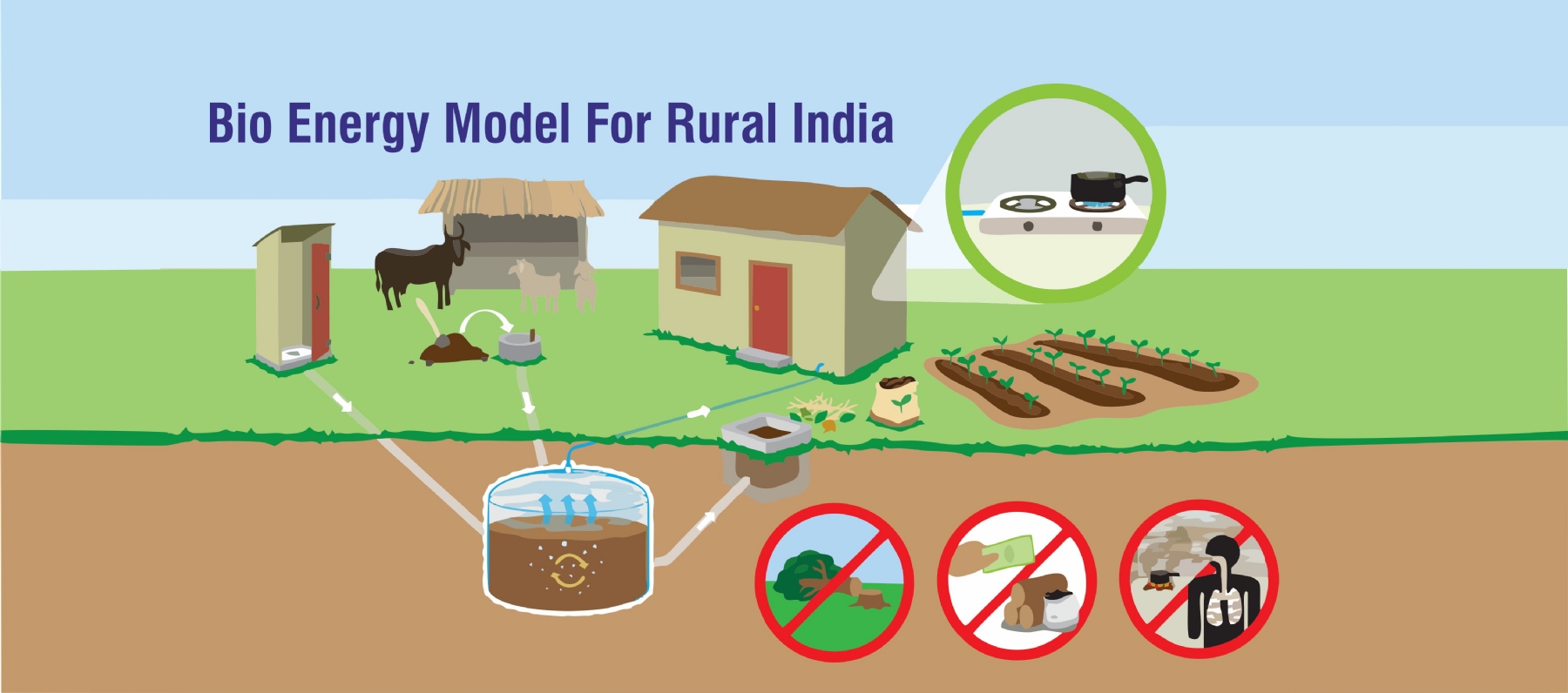Bio Energy Model For Rural India

Bio Energy Model For Rural India
Background :
The use of vegetable oils, wood & plant wastes and animal fats as fuels for lighting and heating purposes dates back to prehistoric times. Usage of Karanj, Neem, Mahua and other vegetable oils as sources of light in rural areas is well recorded in ancient Indian folklore and history. However, the industrial revolution of 18th & 19th centuries and the transportation revolution of 20th century popularised the easily available inexpensive coal and petroleum fuels. However, the OPEC crisis in early 1970`s and the greenhouse gas effects observed later on saw a renewed interest in alternate & renewable sources of energy. Vegetable oils and Bio fuels can trace back their foundations in these developments.
Vegetable Oils as Fuel :
The first diesel engine invented by Rudolf Diesel in late 19th century was actually run on peanut oil. India has seen many successful experiments of Straight Vegetable Oil(SVO) being implemented and yielding results like cost saving, trading of carbon credits, increase in mileage and reduction in pollution when used in transport industry and much more to enumerate. Usage of Pongamia Oil in diesel generators by Dandeli Ferro Ltd., in auto rickshaws and electricity generation by tribals of Adilabad in AP, in buses running on diesel blended with Pongamia oil by Karnataka State Road Transport Corporation etc. are examples of Vegetable oils as fuel.
Bio Fuel :
The term bio fuel as is understood in the modern context, has two major offshoots namely, bio diesel and bio ethanol. These are in reality ways of harnessing solar energy through the medium of plant kingdom involving greening of wastelands which has tremendous environmental benefits as well. The Bio fuel program has evolved into a matured National program in India. There exists a National policy with clear mandate to blend 20% Bio Ethanol in Petrol and 20% Bio Diesel in Diesel by 2017. Learning from the experiences and successes of states like MP, Karnataka and Chhattisgarh a model is proposed for the implementation of the project in 22 tribal villages in Chindwara district of Madhya Pradesh.
Rural Bio Energy Program Model :
The model envisages involvement of the tribal community in massive plantation of various tree based oil (TBO) seeds (non edible) bearing species along the bunds and boundaries of farmers land without affecting the food production. Block plantation on Government waste land, Degraded forest land, and un cultivated farmers land is being encouraged.
Advantages of the Model :
Seed collection from the growing trees yield value added services like oil extraction.
Soap making from the Glycerine as by product etc.
Encouraging usage of de oiled cake as Bio Manure or bio insecticide/pesticide instead of Chemical fertilizers.
The cake can also be used as a feed stock for Bio Methanation.
The pods and other woody bio mass generated can be used for Bio gasification.
The oil, Bio Gas, Producer gas etc will be used for Bio electricity generation for meeting the energy needs of these villages.
Kitchen waste based home Bio gas units will also be built/installed to meet the cooking gas needs.
Components of the Model :
Raising nurseries in at least 4 village clusters that in turn raise grafts which will help reduce the gestation period and Ensuring quality planting material with assured yields and oil percentage.
Land less labourers and especially women will be trained in nursery techniques and empowered to manage these nurseries. It is very important that the agriculture land is not diverted for raising bio fuel species.
The bio fuel species will be interspersed with other fruit bearing, fodder and fuel species. The planting and maintenance will be the responsibility of the owner of the land that will fetch him wages for planting under MGNREGA scheme. The plantation activities can be taken up by women self help groups giving them an opportunity of income.
As it takes years for the trees to mature and start yielding, there could be 5-6 seed collection centres where seeds will be procured with minimum support price assured.
The community will be trained in harvesting and processing techniques for optimal results. These will be developed on a co-operative model similar to milk unions operating in the country.
Every village will be installed with low cost seed decorticators where the seeds will be separated from the pods. The pod shell is an excellent replacement for fuel wood and also an important feed stock for Bio gasifier units
It is proposed to have centres equipped with oil extraction unit, filtering units, storage bins for oil and cake etc. in project areas. These centres will sell oil and de oiled cake to any customer or the seed producers as well.
There will be one bio diesel production centre in a strategic location in the project area. The unit will be equipped with a decorticator, oil expeller, filtering units as well as Esterification unit to convert oil to Bio diesel.
The centre will also have laboratory and quality testing facilities.
The community will be trained and empowered to carry out various activities which would help them make self sufficient with regard to their energy needs, bring about much required stability to agriculture, enhance the quality of the environment and help generate jobs and bring additional income. Success of this project can then be extended to other villages of the country. I look forward to witness bio energy to propel the growth of the nation towards development and prosperity.

